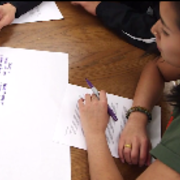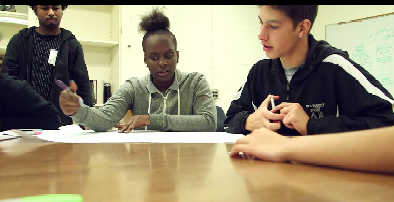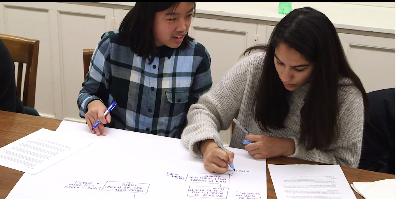
This summer, three Department of Philosophy doctoral candidates took part in a week-long course and mentorship program for area high school students.
The program, entitled “Consent and Civic Participation,” was jointly sponsored by ThinkerAnalytix—a non-profit organization that “develops materials and programs to equip high school students with reasoning skills that cross academic disciplines”—and Harvard Ed Portal, a “collaborative partnership between Harvard University, the City of Boston, the Harvard Allston Task Force, and the Allston-Brighton community.”

Doctoral students Olivia Bailey, Diana Acosta Navas, and Kate Vredenburgh presented philosophical material addressing questions of consent and participation in civic life. Bailey prompted students to consider the extent to which the notion of consent can meaningfully be invoked in justifications of political legitimacy given that people have no choice over the state into which they are born. Students then turned to issues of consent in Title IX cases and practiced their reasoning skills by adjudicating fictional cases as part of a Title IX board. Drawing on material from her recent tutorial, Diana Acosta Navas invited students to discuss two prominent issues on college campuses: the development of regulations on offensive speech and of affirmative consent standards for sexual encounters. Using concepts derived from their reading of Mill’s On Liberty, students in Kate Vredenburgh’s class explored whether fake news should be censored and whether governmental “nudging”—a form of preference manipulation through choice presentation—is sometimes permissible or even obligatory.
Co-founded and co-directed by doctoral candidate Lauren Davidson, ThinkerAnalytix formally began in 2014 with the goal of providing high school students with opportunities “to engage in thoughtful debate about ethical and political issues.” Realizing that many students lacked exposure to good models of effective reasoning, the organization soon shifted its focus to providing students “with effective tools for evaluating other people’s arguments and defending their own views,” which it has sought to do through its educational programs and partnerships. Co-director and co-founder Anne Sanderson, a veteran high school educator and a fellow in philosophy at Harvard, describes the goal of ThinkerAnalytix as a “reasoning revolution.”

“Research has shown that reasoning ability is a key factor in academic achievement. Yet, we rarely teach reasoning skills explicitly. By making research-based tools and targeted training available to students everywhere, ThinkerAnalytix is transforming how high school students improve their reasoning abilities.”
Described by colleagues as the “motive force behind what we do,” Sanderson has pursued this goal by actively building partnerships with the Department of Philosophy at Harvard and with Harvard Ed Portal and by tirelessly experimenting with new approaches to teaching students better reasoning skills.

Building on a foundation of argument mapping, teachers in the summer program incorporated freely available online content from HarvardX courses such as American Government, Bioethics, ContractsX, and JuryX as well as material from philosophical texts. By mapping the arguments made in both printed texts and in audio-visual lectures, students become “more adept at identifying the movements of an argument in any form, whether presented to them on the page, on the television, or through their computer.”
